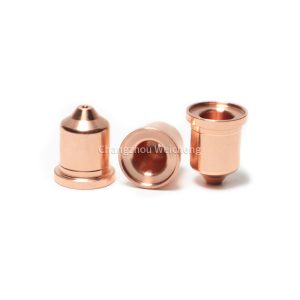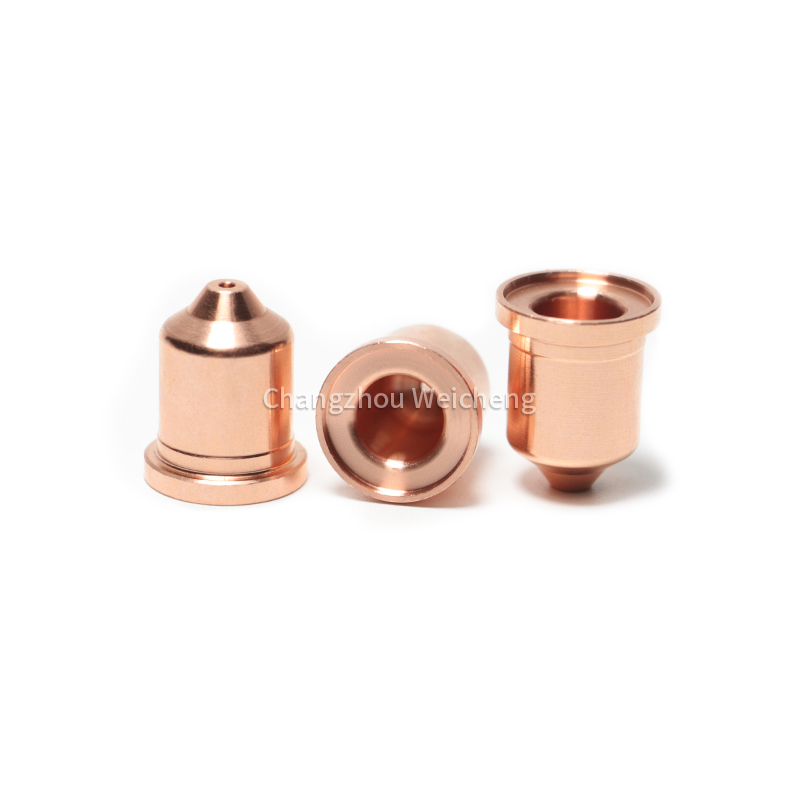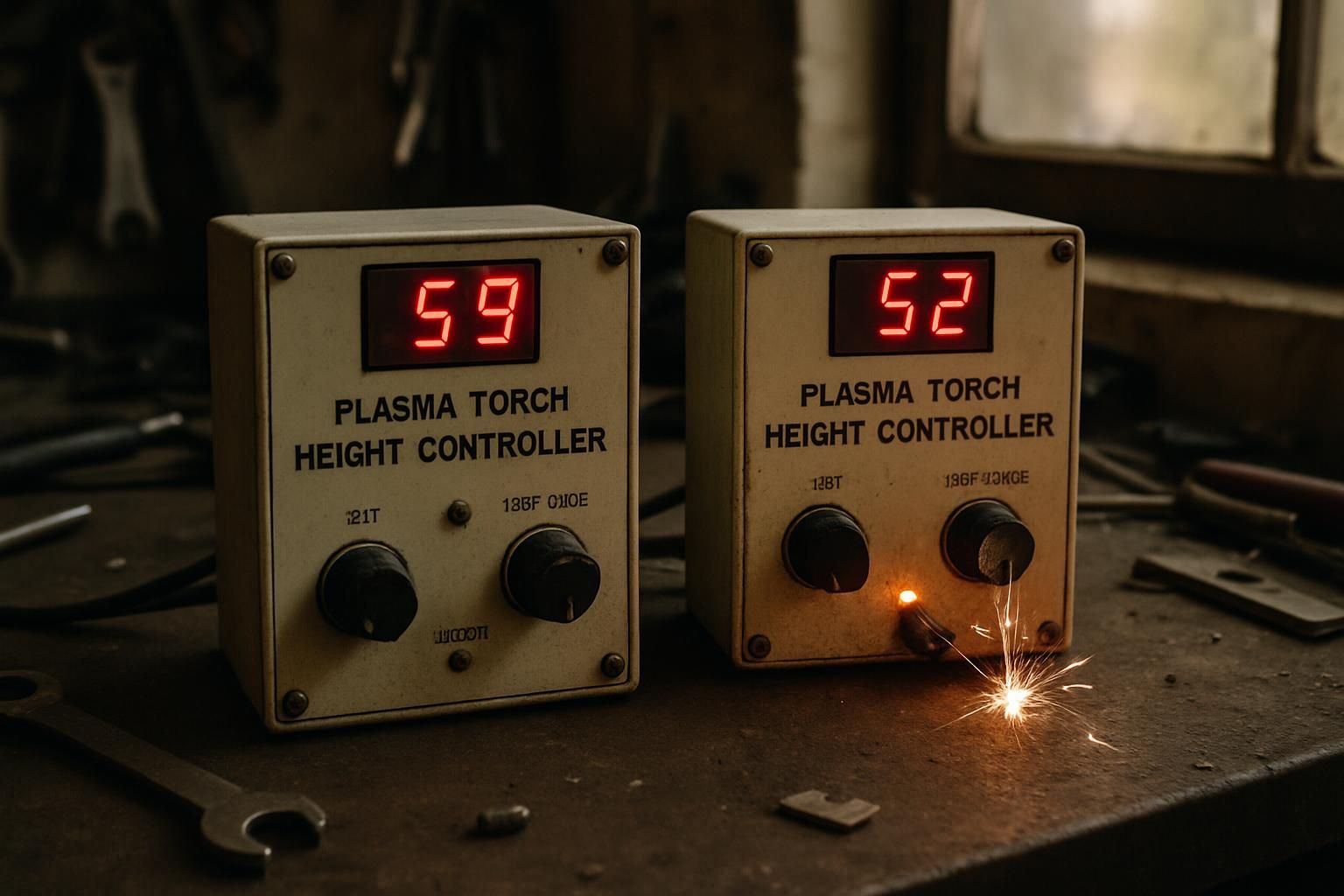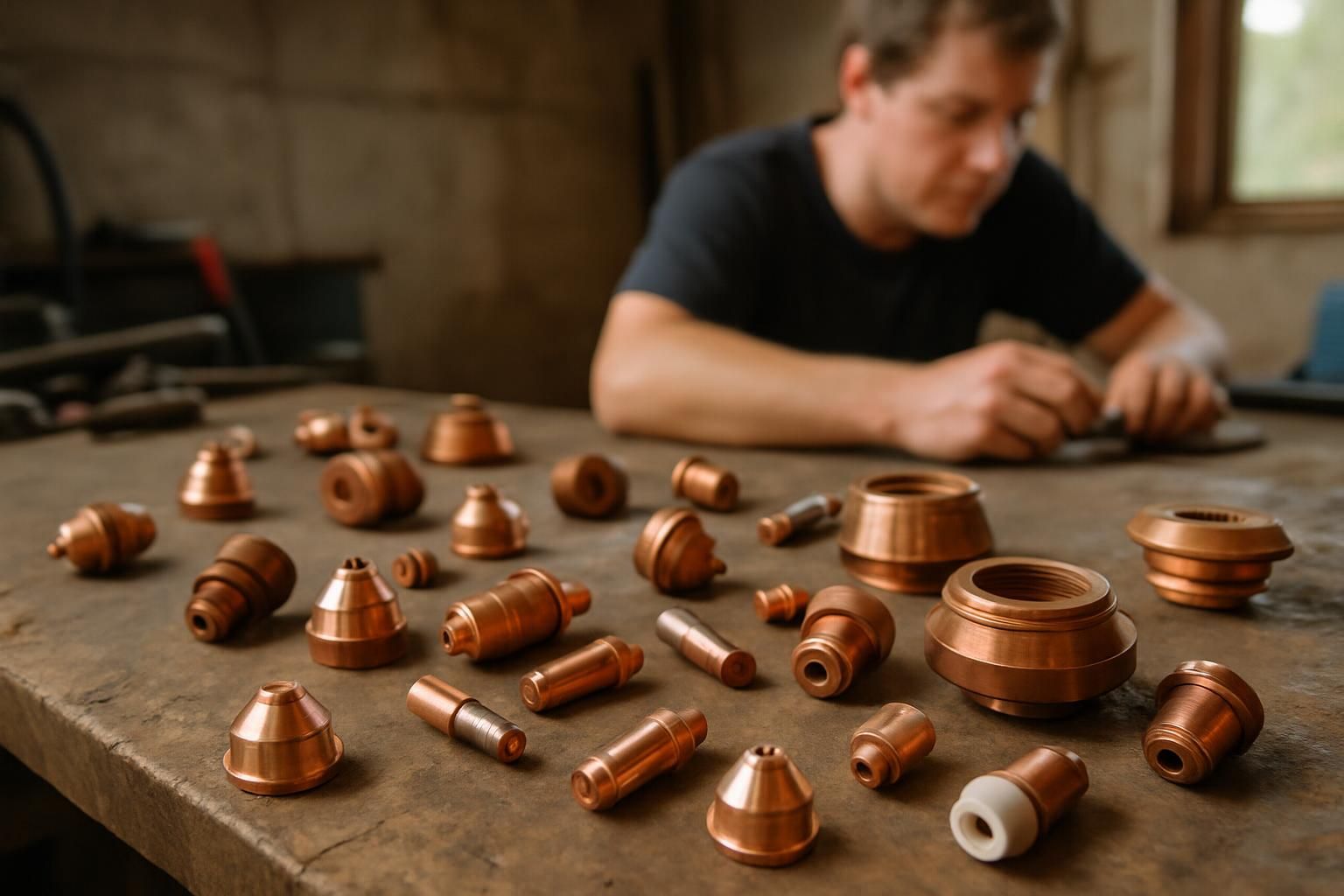Proper plasma consumable storage is the difference between maximizing your cutting performance and watching your profits disappear through premature electrode and nozzle replacement. This comprehensive guide reveals industry-proven storage techniques that extend consumable life from 1 hour to 3 or 5 hours, potentially saving your operation thousands of dollars annually. Whether you’re managing electrodes, nozzles, shield caps, or swirl rings, understanding optimal storage conditions, handling procedures, and inventory management systems will transform your plasma cutting efficiency and dramatically reduce operational costs.

Why Plasma Consumable Storage Matters More Than You Think
Did you know that improper storage can cut your plasma consumable life from 5 hours down to just 1 hour? That’s a 400% increase in replacement costs that most factory never realize they’re paying.
When you invest in quality plasma cutter consumables, proper storage isn’t optional—it’s essential for protecting your bottom line. Whether you’re running a small fabrication shop or managing a large industrial operation, how you store your electrodes, nozzles, and shield caps directly impacts your productivity and profitability.
The plasma cutting industry has seen significant growth, with the global market projected to reach substantial figures by 2032. As operations scale up, proper consumable management becomes even more critical for maintaining competitive advantages.
Understanding Your Plasma Consumables and Storage Needs
What Makes Modern Consumables Different
Today’s plasma cutting consumables aren’t just simple copper parts. Advanced alloy copper construction offers superior thermal conductivity compared to standard red copper alternatives found in many budget options.
The key components requiring careful storage include:
- Electrodes: The heart of your plasma system
- Nozzles: Precision-engineered for arc focus
- Shield caps: Protection from spatter and heat
- Swirl rings: Gas flow optimization
- Retaining caps: Secure assembly components

Material Science Behind Storage Requirements
Understanding what plasma cutter electrodes are made of helps explain why storage matters. Modern electrodes use specialized cores with alloy copper construction that can be compromised by:
- Moisture exposure: Causes oxidation and reduces conductivity
- Temperature fluctuations: Creates thermal stress and micro-cracks
- Contamination: Oil, dust, or chemical residues affect performance
- Physical damage: Improper handling during storage
Setting Up Your Ideal Storage Environment
According to Lincoln Electric’s official plasma cutting resource center, proper consumable handling and storage can significantly extend electrode life and improve overall cutting performance¹. Their research shows that environmental factors like moisture and contamination are primary causes of premature consumable failure.

Temperature and Humidity Control
Your storage area should maintain consistent conditions:
Optimal Temperature Range: 65-75°F (18-24°C)
- Avoid areas near heat sources or direct sunlight
- Prevent thermal cycling that causes expansion/contraction
- Use climate-controlled storage for high-value inventory
Humidity Management: Below 50% relative humidity
- Install dehumidifiers in humid climates
- Use silica gel packs for small storage containers
- Monitor with digital hygrometers for accuracy
Cleanliness Standards
A clean storage environment prevents contamination that can affect plasma cut edge quality:
- Dust-free zones: Use sealed containers or cabinets
- Chemical isolation: Store away from cutting fluids and solvents
- Air filtration: Consider HEPA filters for critical storage areas
Practical Storage Solutions by Operation Size

Small Shop Solutions (1-5 Operators)
Desktop Organizers
- Compartmentalized boxes for different consumable types
- Clear plastic containers for easy identification
- Foam inserts to prevent movement and damage
Cost: $50-200 investment ROI: Prevents 10-15% consumable waste from damage
Medium Facilities (5-20 Operators)
Mobile Cart Systems
- Rolling cabinets with multiple drawers
- Individual compartments for each consumable type
- Locking mechanisms for inventory control
Wall-Mounted Racks
- Space-efficient vertical storage
- Easy access during production
- Clear labeling systems for quick identification
Large Operations (20+ Operators)
Automated Inventory Systems
- Barcode tracking for consumable management
- Climate-controlled storage rooms
- Integration with production planning software
According to industry studies, large operations implementing proper storage systems see 25-30% reduction in consumable costs within the first year.
Handling Best Practices That Extend Consumable Life

Proper Removal and Installation
Following correct procedures prevents damage during maintenance of plasma cutting consumables:
- Always cool completely before removal
- Use proper tools – never force or use pliers
- Inspect threads for damage before storage
- Clean thoroughly with appropriate solvents
Pre-Storage Cleaning Procedures
For Reusable Consumables:
- Remove all spatter and oxidation
- Use brass brushes for stubborn deposits
- Apply light coating of anti-corrosion spray
- Dry completely before storage
For New Consumables:
- Keep in original packaging until use
- Handle with clean gloves only
- Avoid touching electrode tips or nozzle orifices
Packaging Methods for Long-Term Storage
Individual Protection:
- Wrap each consumable in anti-tarnish paper
- Use protective caps for nozzle openings
- Store electrodes tip-up to prevent damage
Bulk Storage:
- Segregate by type and amperage rating
- Use dividers to prevent contact between parts
- Label clearly with part numbers and dates
Cost Analysis: Investment vs. Replacement Savings
Industry research from Hypertherm, a leading plasma cutting technology manufacturer, indicates that proper storage and maintenance procedures can reduce consumable replacement frequency by up to 40%². This data aligns with field studies showing significant cost reductions when facilities implement systematic storage protocols.

Real-World Economics
Let’s examine the financial impact of proper storage:
Scenario: Medium fabrication shop using 50 electrodes monthly
Storage Method | Electrode Life | Monthly Cost | Annual Cost |
| Poor storage | 1 hour average | $750 | $9,000 |
| Proper storage | 5 hours average | $150 | $1,800 |
| Annual Savings | 400% improvement | $600/month | $7,200 |
Storage System ROI Calculation
Initial Investment: $500-2,000 (depending on operation size)
Annual Savings: $3,000-15,000 (based on consumable volume)
Payback Period: 2-6 months for most operations
This analysis doesn’t include the additional benefits of reduced downtime and improved cut quality from using properly stored consumables.
Common Storage Mistakes That Cost Money
The “Mixed Storage” Problem
Many companies make the costly mistake of storing new and used consumables together. This creates several issues:
- Cross-contamination: Used parts contaminate new inventory
- Confusion: Operators can’t distinguish between fresh and worn parts
- Inventory errors: Makes it difficult to track actual usage rates
Improper Stacking and Compression
Stacking consumables without proper support causes:
- Thread damage: Affects proper assembly and gas sealing
- Deformation: Particularly problematic for thin nozzles
- Surface scratches: Can affect gas flow characteristics
Inadequate Environmental Protection
Leaving consumables exposed to shop conditions results in:
- Accelerated oxidation: Reduces electrical conductivity
- Contamination buildup: Affects plasma cutter electrode life
- Moisture absorption: Can cause arc instability
Quality Control and Inventory Management Systems
Visual Inspection Standards
Before storing any consumable, implement these inspection criteria:
For Electrodes:
- Check for pitting or crater formation on tip
- Examine threads for damage or wear
- Look for discoloration indicating overheating
For Nozzles:
- Inspect orifice for roundness and size
- Check for spatter buildup or damage
- Verify thread integrity
For Shield Caps:
- Look for cracks or deformation
- Check mounting surfaces for flatness
- Examine for excessive wear patterns
First-In-First-Out (FIFO) Implementation
Proper rotation prevents consumables from degrading in storage:
- Date all incoming inventory clearly
- Use oldest stock first consistently
- Track usage patterns to optimize ordering
- Monitor shelf life for long-term storage items
Digital Tracking for High-Volume Operations
Modern inventory management systems can track:
- Individual consumable usage rates
- Performance correlation with storage time
- Automated reorder points based on consumption
- Cost analysis per job or project
Troubleshooting Storage-Related Performance Issues
Identifying Storage-Damaged Consumables
Warning Signs:
- Inconsistent arc starting
- Premature consumable failure
- Poor cut quality despite proper settings
- Excessive spatter formation
Diagnosis Steps:
- Compare performance with known good consumables
- Check storage conditions where questionable parts were kept
- Examine for visible signs of contamination or damage
- Test electrical continuity on electrodes
Performance Symptoms and Solutions
| Symptom | Likely Cause | Storage Solution |
| Difficult arc starting | Electrode contamination | Improve cleaning procedures |
| Irregular cut quality | Nozzle orifice damage | Better protective packaging |
| Premature failure | Moisture exposure | Humidity control implementation |
| Arc wandering | Thread corrosion | Anti-corrosion storage methods |
Recovery Procedures
For mildly contaminated consumables:
- Light cleaning: Use appropriate solvents and brushes
- Reconditioning: Light machine work for repairable damage
- Testing: Verify performance before returning to production
However, severely damaged consumables should be discarded rather than risk poor cut quality or equipment damage.
Future-Proofing Your Storage System
Scalable Solutions for Growing Operations
As your business expands, your storage system should adapt:
Modular Storage Systems:
- Add capacity without complete overhaul
- Maintain consistent storage standards across locations
- Integrate with existing inventory management
Technology Integration:
- RFID tracking for high-value consumables
- Environmental monitoring with alerts
- Predictive analytics for consumption patterns
Integration with Production Planning
Modern shops are connecting storage management with:
- Job scheduling systems: Ensure consumables are ready when needed
- Quality tracking: Correlate storage time with performance
- Cost accounting: Accurate job costing including consumable usage
Emerging Technologies
Smart Storage Solutions:
- IoT sensors for environmental monitoring
- Automated dispensing systems
- Blockchain tracking for supply chain verification
Predictive Maintenance:
- AI analysis of usage patterns
- Automated reordering based on production schedules
- Performance optimization recommendations
Industry Applications and Specific Requirements
The American Welding Society’s guidelines for industrial plasma cutting operations emphasize that storage environment control is critical for maintaining consumable quality, particularly in high-humidity environments common in shipbuilding and offshore fabrication³.
Different industries have unique storage requirements based on their operating environments:
Shipbuilding Operations
Shipbuilding environments require special consideration:
- Salt air protection: Enhanced corrosion prevention
- High humidity: Upgraded dehumidification systems
- Large inventory: Bulk storage with rotation systems
Aerospace Manufacturing
Aerospace applications demand the highest standards:
- Traceability requirements: Complete documentation of storage conditions
- Quality certifications: Storage procedures as part of quality systems
- Contamination control: Clean room storage environments
Automotive Manufacturing
Automotive production requires:
- High-volume management: Automated storage and retrieval
- Just-in-time delivery: Strategic placement near production lines
- Cost optimization: Lean inventory management principles
Conclusion: Maximizing Your Plasma Cutting Investment
Proper plasma consumable storage isn’t just about organization—it’s about protecting your investment and maximizing your cutting performance. By implementing the strategies outlined in this guide, you can:
- Extend consumable life by up to 400%
- Reduce replacement costs significantly
- Improve cut quality consistency
- Minimize production downtime
Remember that quality consumables deserve quality storage. Whether you’re just starting with plasma cutting tips for beginners or optimizing an existing operation with expert plasma cutting tips, proper storage practices form the foundation of efficient operations.
The investment in proper storage systems typically pays for itself within months through reduced consumable waste and improved productivity. As the plasma cutting industry continues to grow and evolve, those who master the fundamentals—including proper consumable storage—will maintain their competitive advantage.
Start implementing these storage best practices today, and watch your consumable costs drop while your cutting performance improves. Your bottom line will thank you.













